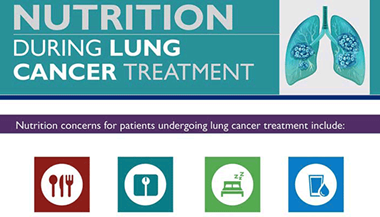

Lung cancer is the most prevalent kind of cancer in the United States, excluding nonmelanoma skin cancer, and it is the leading cause of cancer mortality. Smoking, secondhand smoke, and radon are all known carcinogens that contribute to the development of lung cancer. Lung cancer is classified into two types: non-small-cell lung cancer, which is the most common, and small-cell lung cancer, which is less common. Surgery, chemotherapy, radiation, or a combination of these treatments may be used. Nutrition-related adverse effects of cancer treatment, such as anorexia, nausea and vomiting, and esophagitis, are frequently treated using medical nutrition therapy.
Avoiding airborne toxins and increasing fruit and vegetable diet are the greatest ways to prevent lung cancer. According to studies, smokers who consumed significant doses of beta-carotene and vitamin A supplements had a higher incidence and death of lung cancer. Food-based beta-carotene, along with a diet rich in fruits and vegetables, has been shown to protect against lung disease. Lung cancer patients frequently use complementary and alternative medicine; thus, doctors should explore if patients use complementary and alternative medicines and advise them on how to utilise them to minimise any potential adverse effects.
Also Read: Radiation Therapy for Non-Small Cell Lung Cancer
The following are examples of cancer therapy side effects, however, they are not exhaustive:
These side effects can be difficult to deal with and might leave you weary. This can make meals less enjoyable, and some people may even stop eating altogether.
At each meal, include protein, carbohydrate, and fat. This will fulfil you while also providing important nutrients.
Eat fresh veggies, whole grains, fruit, and protein whenever feasible.
Hard-boiled eggs, nuts, seeds, nut butter, peanut butter, and hummus are all high-protein snacks.
Stay hydrated by drinking water frequently throughout the day.
Currently, between 3050 per cent of malignancies can be prevented by avoiding risk factors and applying existing evidence-based preventative strategies, according to the World Health Organization. The 2012 American Cancer Society (ACS) Guidelines for Cancer Prevention, which demonstrate a clear association between increased adherence to diet recommendations and decreased cancer risk, are one of these evidence-based interventions.

Lung cancer has a slow onset and is usually advanced by the time it is discovered. The following are clinical indications and symptoms that may indicate lung cancer:
Also Read: Overview of Non-small cell lung cancer
Hypercalcemia, syndrome of inappropriate antidiuretic hormone secretion (SIADH), neurologic syndromes, polymyositis and dermatomyositis, Cushing's syndrome, Lambert-Eaton myasthenic syndrome, and a variety of hematologic abnormalities, such as anaemia, leukocytosis, thrombocytosis, and hypercoagulable disorders, are all possible complications of lung cancer.

Nutritional considerations: Although tobacco smoking and, to a lesser extent, air pollution, asbestos, and radon are the leading drivers of (LC), nutrition plays a surprising role as well. The fact that smokers tend to have lower intakes and/or blood levels of several preventive nutrients than nonsmokers complicates research on the links between food, smoking, and lung cancer risk Certain eating habits have been linked to a reduced risk of lung cancer. Higher scores on one of several healthy eating classification schemes (the Healthy Eating Index2010, Alternate Healthy Eating Index2010, alternate Mediterranean Diet score, and Dietary Approaches to Stop Hypertension) were linked with a 14-17 per cent reduction in this cancer risk in the NIH-AARP (National Institutes of HealthAmerican Association of Retired Persons) Diet and Health study.
Personalized Nutritional Care for Cancer Patients
For personalized guidance on cancer treatments and complementary therapies, consult our experts atZenOnco.ioor call+91 9930709000
Reference: